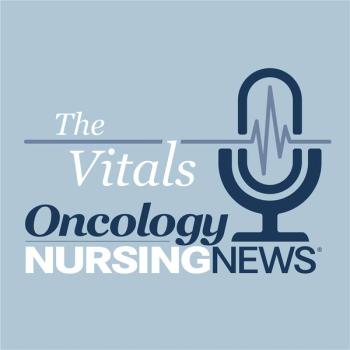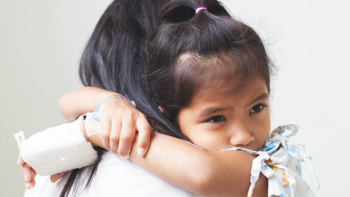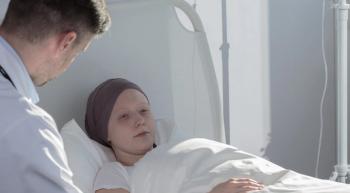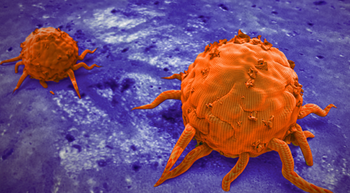
The United States Preventative Services Task Force now recommends colorectal cancer screening to start at 45 years old.

The United States Preventative Services Task Force now recommends colorectal cancer screening to start at 45 years old.


The FDA has granted a rare pediatric disease designation to the p-STAT3 inhibitor WP1066 for the treatment of patients with ependymoma, a rare type of tumor that can develop in the brain or the spinal cord.

Overall, 3 objective responses were recorded from 16 eligible patients in the neuroblastoma cohort, which met the protocol-defined efficacy end point.

The National Comprehensive Cancer Network has issued guidelines for the management of children with a rare type of kidney cancer referred to as Wilms Tumor, or nephroblastoma.

Parents of pediatric patients with cancer were more likely to believe COVID-19 misinformation than parents of children without cancer.

Ruxolitinib, when administered using a pediatric dosing algorithm, was found to elicit responses in patients with chronic graft-versus-host disease with acceptable safety.

The FDA has approved crizotinib for the treatment of pediatric patients 1 year of age and older and young adults with ALK-positive relapsed or refractory, systemic anaplastic large cell lymphoma.

“But our study is pointing to new genes to consider. For example, we found that the BRCA2 gene, typically associated with adult breast and ovarian cancer, may also somehow influence the susceptibility of pediatric RMS.”

The FDA approved pralsetinib (Gavreto) for adults and children aged 12 or older with advanced or metastatic RET-mutant medullary thyroid cancer (MTC) who need systemic therapy or RET fusion-positive thyroid cancer who require systemic therapy and are radioactive iodine-refractory.

The FDA has granted an accelerated approval to naxitamab-gqgk (Danyelza) for use in combination with granulocyte-macrophage colony-stimulating factor as a treatment for pediatric patients 1 year of age and older and adult patients with relapsed/refractory high-risk neuroblastoma in the bone or bone marrow who have demonstrated a partial response, minor response, or stable disease to prior treatment.

From compassionate listening to syringe water fights, children shared some creative ways that nurses have managed to make their care a bit less scary.

Being hospitalized for cancer can be a frightening experience for a child, but a friendly and approachable nurse can make all the difference.

TP53 was found to be the only gene with a germline de novo pathogenic or likely pathogenic variant in pediatric patients with osteosarcoma, according to findings from the Children’s Oncology Group that were published in JCO Precision Oncology.

The FDA has granted an orphan drug designation and rare pediatric disease designation to the bispecific antibody nivatrotamab for the treatment of patients with neuroblastoma, according to an announcement from Y-mAbs Therapeutics, Inc.

The FDA has granted a priority review to a supplemental new drug application (sNDA) for crizotinib (Xalkori) in the treatment of pediatric patients with ALK-positive relapsed/refractory systemic anaplastic large cell lymphoma (ALCL), according to an announcement from Pfizer, Inc.

There is currently no way to measure chemotherapy-induced peripheral neuropathy in pediatric patients, but a team of nurse researchers are developing a new tool to meet this need.

Blinatumomab (Blincyto) monotherapy as consolidation therapy prior to allogeneic hematopoietic stem cell transplant (HSCT) resulted a significant improvement in event-free survival (EFS) and a lower risk of recurrence in children with high-risk B-cell precursor (BCP­)–acute lymphoblastic leukemia (ALL).

The FDA’s Oncologic Drugs Advisory Committee voted in favor of approving remestemcel-L for the treatment of children with steroid-refractory acute graft-versus-host disease.

This research suggested the need for reassessment of the methods by which childhood cancer treatment delivery are approached during crises.

The FDA recently released guidelines expanding clinical trial eligibility for investigational cancer drugs for pediatric patients.

Following the arrival of the coronavirus disease 2019 pandemic, St. Jude Children's Research Hospital launched the first Global COVID-19 Observatory and Resource Center for Childhood Cancer.

Pediatric precision oncology in a real-world, multinational setting is feasible. For the subgroup of children with very high priority level targets, the INFORM registry provided therapeutic opportunities and new diagnostic information.

Two researchers spoke about the recent FDA approval for this patient population, and what more needs to be done in the space.

The FDA approved selumetinib (Koselugo) to treat pediatric patients aged 2 years or older with neurofibromatosis type 1. This is the first-ever therapy approved for this rare genetic disorder, which causes tumors to grow on nerves.